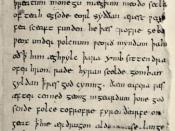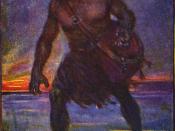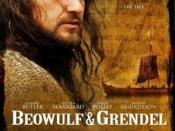In reading Beowulf, many perceive the values of the society described to be unethical and deviating from modern perceptions of morality. However, is modern humanity so different? While it is true that values change and evolve as time progresses, it seems ideologies are never truly extinct. Many of the same flaws exist in humanity today as they did centuries ago, and as they do in the fictional society of Beowulf. Humanity should apply itself and learn from the mistakes of its predecessors and from literature that aims to expose the vices of humanity. Several such morals are recognizable in the epic poem Beowulf. The aspects of greed and self-importance, a concrete belief in good versus evil, and the initiation and consequences of war are specific themes that pertain most explicitly to modern society.
In the capitalist society of modern Canada, greed and self-importance are indirectly encouraged through self-interest as a fundamental value.
HumanityÃÂs aim in this society is to monetarily gain as much as possible for oneÃÂs own self and devise ways to profit the most from available assets. This materialistic attitude can also be witnessed in the society of Beowulf. The epic hero himself is led to his demise because of his unquenchable thirst for treasure and glory. When addressing his men, Beowulf states: ÃÂBy deeds of daring IÃÂll gain the gold/Or death in battle shall break your lordÃÂ (1506-1507). By going into battle with the dragon, his deadliest and most ominous enemy, Beowulf considers the possibility of the encounter being fatal; yet he is willing to accept death as a reasonable consequence in his pursuit of gold and riches. Even in his last moments, Beowulf does not regret his decision to battle the dragon, nor is he mindful of the consequences. He does not...


